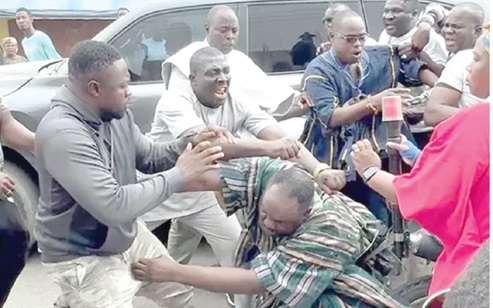Seven months after the 2024 parliamentary elections, voters in Ablekuma North Constituency finally have an elected Member of Parliament (MP).
It took a rerun of the election in 19 polling stations, not counting wading through many controversies surrounding collation and re-collation since December 7, 2024 to bring finality to the election in this constituency.
Reflecting over events as they unfolded and the lessons they offer is akin to the famous Italian movie titled “The Good, The Bad and The Ugly.”
The good
Whatever created the inability to find a workable solution to the Ablekuma North impasse raised the prospects of another constituency without representation in Parliament for a long time.
The lessons of SALL (Guan Constituency), fresh on the minds of many, meant that it was incumbent upon all parties to find a way out of the impasse.
It is therefore commendable that, notwithstanding the length of time, the election has been concluded, a winner declared, and citizens in Ablekuma North will not be denied representation any longer in the Ninth Parliament.
The Electoral Commission’s (EC’s) decision to re-run the election in 19 polling stations, which was met with considerable objection from the main opposition New Patriotic Party (NPP), offers an example of how administrative decisions, within the confines of the law, can be deployed to resolve election disputes.
The EC has the responsibility of ensuring a free and fair election, and if declaring election results without the full complement of all polling stations had the potential to compromise the integrity of the outcome, it was only proper for the institution charged with conducting elections to come up with a remedy.
Perhaps less litigation (resort to courts, unless unavoidable) and more administrative remedies can help shorten the length of time it takes to resolve some of these electoral disputes.
The bad
Even as the EC’s administrative remedy to ensure the integrity of the election outcome in the constituency is commendable, the way the decision was arrived at and communicated revived conversations about trust and confidence in the institution.
Recall that in the estimation of the EC, in a June 19 appearance in Parliament, security was the main issue preventing collation and declaration of results.
It even impressed upon Parliament to intervene and impress upon the Ghana Police Service to provide the needed security to complete the exercise. To move from security to a need for re-running in certain polling stations, although an appropriate administrative remedy, opened the EC up for criticism.
In the future, it is important for the EC to exercise caution and endeavour to avoid shifting narratives that can erode trust in the institution.
Even as the EC is asked to shoulder much of the blame for the Ablekuma North impasse, we must not overlook the contributing role played by our two main political parties – NPP and the National Democratic Congress (NDC).
I reckon the low level of trust our political parties, especially when in opposition, tend to have in the EC.
This fuels their penchant to engage in activities in the name of protecting the integrity of the ballot.
However, these activities, such as the congregation of party supporters at collation centres, displaying unrestrained partisan sentiments, created some of the disruptions and chaos that prevented EC officials from declaring results or questioning the validity of some of the declared results.
Perhaps, in future, the parties working with the EC through the Inter-Party Advisory Committee (IPAC) platform can forge consensus around protocols for collation centres to reduce tensions and the prospect of chaos.
The ugly
There is no other way but to describe the incidents of electoral violence observed as a shameful blot on the integrity of our elections and democratic architecture.
We often describe these incidents as isolated acts of violence because they do not happen on a large scale in a way that is disruptive to the entire election.
However, with each election, these “isolated” acts of violence potentially have the unintended consequences of normalising violence as part of our electoral process.
Beyond the commendation it deserves from all well-meaning Ghanaians, swift punishment for the identified perpetrators is needed to serve as a deterrent.
More importantly, it is time for key institutions who have the responsibility for the peace and security of the country as well as ensuring the integrity of election to develop a comprehensive anti-electoral violence plan before these “isolated” incidents get out of hand.
The unfortunate passing of the MP for Akwatia means that soon there will be another election to select an MP for the constituency.
Perhaps our better angels will prevail so we can avoid the bad and ugly of Ablekuma North.
The writer is Director, Democracy Project

